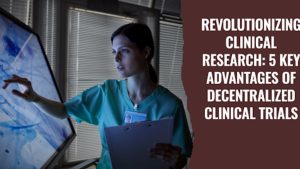
Decentralized clinical trials (DCTs) have recently transformed the clinical trial landscape. The traditional, site-focused paradigm has given way to a cutting-edge strategy centered on technology and local medical professionals. Decentralized Clinical Trials are revolutionizing how research is conducted in this day and age. Consider it as clinical research conducted directly with patients, escaping the constraints of academic institutions and hospitals. These clinical trials are more accessible and patient-centric since they can occur at neighborhood clinics or even at the convenience of a patient’s home.
The secret lies in the computerized data-collection systems that combine accuracy and speed. Local doctors provide a distinctive flavor. Their knowledge of patients’ health journeys lends DCTs an additional element of authenticity, producing real-world results that accurately represent real patient experiences. Patients who participate in DCTs are partners rather than merely participants. Adherence, retention, and data quality are all boosted by more empowerment and participation. This essay will examine the many advantages decentralized clinical trials provide, altering how research is done and eventually enhancing patient results and experiences.
1.Enhanced Patient Access and Engagement

With decentralized clinical trials, clinical trials come knocking at your door, and you don’t have to rush to clinical sites for every check-up. The traditional clinical trial site takes a back seat in this new-age approach. Instead, researchers use video calls, mobile apps, and smart devices to remotely track your health data, all from the coziness of your abode. No more long journeys to clinical sites or navigating through traffic and busy schedules.
But it’s not just about convenience. DCTs tear down the barriers of distance, opening doors for diverse participation. Think about it: folks who live far from trial sites or those with mobility challenges can now step into the realm of research. Even those living in rural areas, often overlooked in traditional trials, have a voice here.
Trained clinicians beam into your home through video conferencing, ensuring you receive top-notch care without stepping outside your door.
2.Improved Patient Retention

In clinical trials, patient retention is a sentinel of utmost importance, influencing the validity and reliability of the study. Traditional clinical research dealt with challenges like long journeys to the trial site, schedules demanding a juggling act, and the ever-mounting paperwork. While seemingly mundane, these factors can lead to a domino effect of patient dropouts.
Now, shift your focus to decentralized trials, offering participants adaptable schedules and reducing the need for frequent physical visits. They contribute to cutting-edge research without geographic constraints since virtual and remote monitoring replaces traditional clinic visits.
But it’s not just about ease; it’s about empowerment. By embracing technology, these trials turn participants from mere subjects to active collaborators. Mobile devices and wearable tech become the conduits through which real-time data flows, enabling researchers to gain insights faster and participants to engage more deeply.
3.Real-Time Data Collection and Analysis

A clinical trial that doesn’t confine participants to clinic walls that rely solely on periodic check-ins can transform research. In the traditional realm, participants would embark on journeys to designated research sites, met by clinicians armed with clipboards and pens. These visits, though crucial, are snapshots in time, capturing data at intervals.
But in decentralized trials, a revolution is underway. Here, a fitness tracker or a smartwatch is not just a style statement but a research partner. These wearable devices are the conduits through which real-time data flows. Vital signs are monitored continuously, and the information doesn’t wait for the next clinic visit to be recorded.
It also has electronic diaries where real-time data from home visits by clinicians is entered. No more papers, no more administrative weight.

